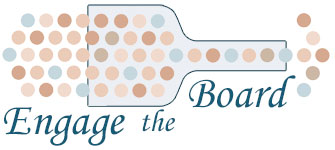How the Board Café Improves Board Functions
In the boardroom specifically, the Board Cafe’ provides members with an opportunity to remove the board table as a bottleneck when exercising the governance function. Kathy has adapted the process and its principles to
- develop engagement in the boardroom
- establish dialogue with all parties
- create an assessment of governance knowledge and its requirements.
Unlike other facilitation approaches, the café host
- harvests information and stories
- shares collective discoveries
- creates collective intelligence
Still Trying to Decide?
Think of a board’s ability to function in terms of a symphony orchestra…
Board members often come together like a symphony with each musician playing a different piece. Regardless of what the conductor does the sound is cacophonous. Our Board Café shows the board how to work in harmony.
Origins of the Board Cafe’
There are two challenges to engaging the board and supporting their functionality as a working body:
- Variance in perspective on board governance,
- reticence of the various members to question their own view with that of other board members
These challenges tend to remain in place until the group’s members are fully engaged in the conversations. To remove this bottleneck we use the principles of the World Café (1) to restart the process. The seven principles and practices include:
- Setting the context
- Creating hospitable space
- Exploring questions that matter
- Encourage everyone’s Contribution.
- Cross-pollinate and connect diverse perspectives.
- Listen for patterns.
- Encourage everyone’s contribution
In general practice, the principles include creating intimate spaces for conversations which encourage members to explore specific and relevant questions that matter to the group. The combination of these activities build collective intelligence and group cohesion.
(1) World Café was discovered by Juanita Brown and David Isaacs. It was used in Brown’s doctoral dissertation, at Fielding Graduate University, and as a metaphor for a strategic process for group development in a variety of settings.
